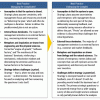Business Transformation Requires Transformational Leaders
Leadership and teaming skills are front and center in times of rapid change. Meet today’s constant disruption head on with expert guidance in leadership, business strategy, transformation, and innovation. Whether the disruption du jour is a digitally-driven upending of traditional business models, the pandemic-driven end to business as usual, or the change-driven challenge of staffing that meets your transformation plans — you’ll be prepared with cutting edge techniques and expert knowledge that enable strategic leadership.
Subscribe to Arthur D. Little's Culture & Leadership Newsletter
Insight
In this article, the authors argue the past is a poor playbook for the future when it comes to delivering real business value from technology. Whilst successful exploitation of legacy technologies is critical, the best practices that the IT industry has promoted and applied for the last 20 years have little value in this endeavor. In a fundamentally changed world, technologists will need to embrace and adopt "next practices" if they are to be successful. Before moving on to this challenge, though, we first need to establish that the situation we face as technologists has indeed changed fundamentally.
CxOs believe technological advances are driving the shift in the competitive environment. But there are marked differences in how they're preparing to take on digital invaders and attackers from other industries. CxOs increasingly leverage new technologies to focus on customers as individuals. And they see a need to collaborate more, with more external parties, for innovation. Although many organizations acknowledge the need to get closer to the action, as the authors describe in this article, it's "torchbearers" who are exploring new opportunities in adjacent spaces. Torchbearers do not try to emulate everything a digital invader would do, but they do have a keener sense of how the competitive arena has shifted. Torchbearers are more likely to be looking forward and looking outward to entering new markets and embracing a more decentralized management style. Torchbearers are poised to strike back.
Collaborating closely with the public employment service for the Flemish region in Belgium, VDAB, we created a digital strategy for VDAB using a novel method called Action Design Research. In this article, we present VDAB's approach to digital transformation, together with its digital strategy, the "boundary-breaking rules." Coining these rules was an important first step in VDAB's digital transformation, as they show the "boundary-breakingly" different ways in which VDAB will have to work.
Cutter Fellow Steve Andriole suggests five steps to successful corporate digital transformation. These have emerged from the DT efforts we've seen over the past few years and from the cumulative understanding of enterprise program management that has evolved over the past 50 years. Some of these steps are obvious, but some are not. Put another way, not every company can -- or should -- be digitally transformed. So before setting up an "Innovation Lab" or funding huge DT projects, do some homework.
A digital transformation isn't just launching a brand on social media, hosting an electronic storefront, or connecting the enterprise workforce. Nor is it activating big data or analytics to synthesize new differentiators. A digital transformation requires escape from the routine mindset of business strategy to discover adjacent opportunities and strategies that create an asymmetric competitive advantage (i.e., a powerful advantage that denies competitors the use of similar strategies and tactics).
Winners, Survivors, & Losers
In this article, Paul Clermont examines the scope of digital transformation, what kinds of enterprises are most threatened or helped by it, how to recognize threats and opportunities, and how to become a survivor — or a winner.
With this issue of Cutter IT Journal, we aim to bring more perspective to the question of how to digitally transform. All the contributing authors agree that digital transformation will be profoundly complex, but this complexity does not prevent them from bringing useful perspectives to the table and suggesting approaches for how to frame and launch transformation. This issue does not glorify startups, big-bang disruption, or Silicon Valley; it does, however, investigate what lessons incumbents can take from digital natives. It also broadens the scope to include historical framing of the challenge, as well as the authors' rich experience and expertise in working with incumbent organizations.
Calling All Renaissance Kids
Tomorrow's problems and the innovation needed to solve them are likely to require multiple disciplines. One person with multiple domains of knowledge becomes increasingly valuable.












